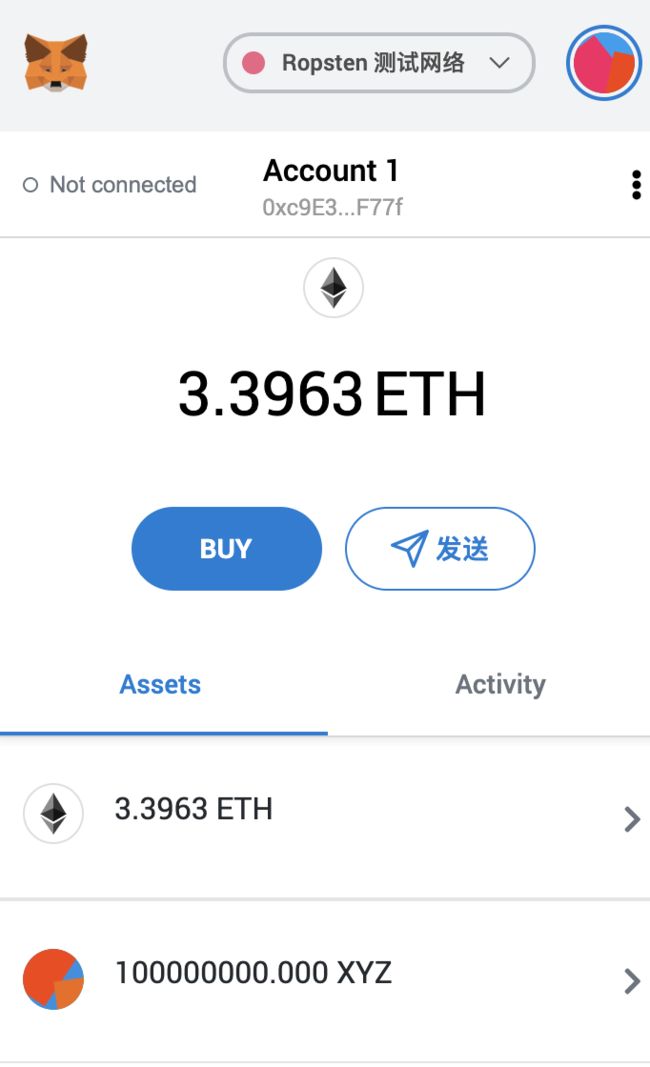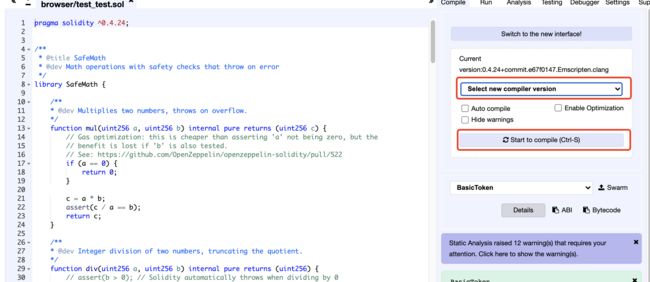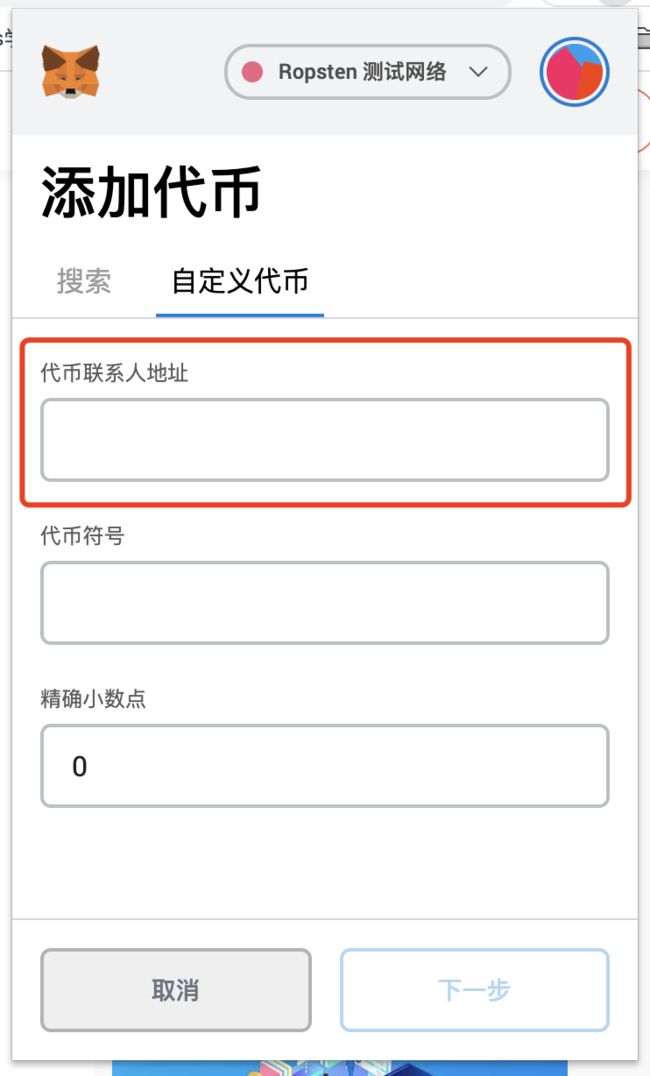以太坊测试网ERC20发币
1.准备
在发Token前,你先的确定一下几点:
- Token的名称
- Token的标识
- Token的小数位
- Token发型量
2.安装MetaMask钱包
在Chrome浏览器中安装MetaMask之后,登陆Metamask, 左上角选择Ropsten。如下图:
3.测试网申请eth
4.编译合约
打开Solidity Remix Compiler ,remix 是一个在线编译器可以帮我们把智能合约直接发布到以太坊上。
选择Use previous version
4.1 拷贝合约
拷贝以下ERC20合约
pragma solidity ^0.4.24;
/**
* @title SafeMath
* @dev Math operations with safety checks that throw on error
*/
library SafeMath {
/**
* @dev Multiplies two numbers, throws on overflow.
*/
function mul(uint256 a, uint256 b) internal pure returns (uint256 c) {
// Gas optimization: this is cheaper than asserting 'a' not being zero, but the
// benefit is lost if 'b' is also tested.
// See: https://github.com/OpenZeppelin/openzeppelin-solidity/pull/522
if (a == 0) {
return 0;
}
c = a * b;
assert(c / a == b);
return c;
}
/**
* @dev Integer division of two numbers, truncating the quotient.
*/
function div(uint256 a, uint256 b) internal pure returns (uint256) {
// assert(b > 0); // Solidity automatically throws when dividing by 0
// uint256 c = a / b;
// assert(a == b * c + a % b); // There is no case in which this doesn't hold
return a / b;
}
/**
* @dev Subtracts two numbers, throws on overflow (i.e. if subtrahend is greater than minuend).
*/
function sub(uint256 a, uint256 b) internal pure returns (uint256) {
assert(b <= a);
return a - b;
}
/**
* @dev Adds two numbers, throws on overflow.
*/
function add(uint256 a, uint256 b) internal pure returns (uint256 c) {
c = a + b;
assert(c >= a);
return c;
}
}
/**
* @title ERC20Basic
* @dev Simpler version of ERC20 interface
* See https://github.com/ethereum/EIPs/issues/179
*/
contract ERC20Basic {
function totalSupply() public view returns (uint256);
function balanceOf(address who) public view returns (uint256);
function transfer(address to, uint256 value) public returns (bool);
event Transfer(
address indexed _from,
address indexed _to,
uint256 _value
);
}
/**
* @title Basic token
* @dev Basic version of StandardToken, with no allowances.
*/
contract BasicToken is ERC20Basic {
using SafeMath for uint256;
mapping(address => uint256) balances;
uint256 totalSupply_;
/**
* @dev Total number of tokens in existence
*/
function totalSupply() public view returns (uint256) {
return totalSupply_;
}
/**
* @dev Transfer token for a specified address
* @param _to The address to transfer to.
* @param _value The amount to be transferred.
*/
function transfer(address _to, uint256 _value) public returns (bool) {
require(_to != address(0));
require(_value <= balances[msg.sender]);
balances[msg.sender] = balances[msg.sender].sub(_value);
balances[_to] = balances[_to].add(_value);
emit Transfer(msg.sender, _to, _value);
return true;
}
/**
* @dev Gets the balance of the specified address.
* @param _owner The address to query the the balance of.
* @return An uint256 representing the amount owned by the passed address.
*/
function balanceOf(address _owner) public view returns (uint256) {
return balances[_owner];
}
}
/**
* @title ERC20 interface
* @dev see https://github.com/ethereum/EIPs/issues/20
*/
contract ERC20 is ERC20Basic {
function allowance(address owner, address spender)
public view returns (uint256);
function transferFrom(address from, address to, uint256 value)
public returns (bool);
function approve(address spender, uint256 value) public returns (bool);
event Approval(
address indexed _owner,
address indexed _spender,
uint256 _value
);
}
/**
* @title Standard ERC20 token
*
* @dev Implementation of the basic standard token.
* https://github.com/ethereum/EIPs/issues/20
* Based on code by FirstBlood: https://github.com/Firstbloodio/token/blob/master/smart_contract/FirstBloodToken.sol
*/
contract StandardToken is ERC20, BasicToken {
mapping (address => mapping (address => uint256)) internal allowed;
/**
* @dev Transfer tokens from one address to another
* @param _from address The address which you want to send tokens from
* @param _to address The address which you want to transfer to
* @param _value uint256 the amount of tokens to be transferred
*/
function transferFrom(
address _from,
address _to,
uint256 _value
)
public
returns (bool)
{
require(_to != address(0));
require(_value <= balances[_from]);
require(_value <= allowed[_from][msg.sender]);
balances[_from] = balances[_from].sub(_value);
balances[_to] = balances[_to].add(_value);
allowed[_from][msg.sender] = allowed[_from][msg.sender].sub(_value);
emit Transfer(_from, _to, _value);
return true;
}
/**
* @dev Approve the passed address to spend the specified amount of tokens on behalf of msg.sender.
* Beware that changing an allowance with this method brings the risk that someone may use both the old
* and the new allowance by unfortunate transaction ordering. One possible solution to mitigate this
* race condition is to first reduce the spender's allowance to 0 and set the desired value afterwards:
* https://github.com/ethereum/EIPs/issues/20#issuecomment-263524729
* @param _spender The address which will spend the funds.
* @param _value The amount of tokens to be spent.
*/
function approve(address _spender, uint256 _value) public returns (bool) {
// avoid race condition
require((_value == 0) || (allowed[msg.sender][_spender] == 0), "reset allowance to 0 before change it's value.");
allowed[msg.sender][_spender] = _value;
emit Approval(msg.sender, _spender, _value);
return true;
}
/**
* @dev Function to check the amount of tokens that an owner allowed to a spender.
* @param _owner address The address which owns the funds.
* @param _spender address The address which will spend the funds.
* @return A uint256 specifying the amount of tokens still available for the spender.
*/
function allowance(
address _owner,
address _spender
)
public
view
returns (uint256)
{
return allowed[_owner][_spender];
}
}
contract KHToken_StandardToken is StandardToken {
// region{fields}
string public name;
string public symbol;
uint8 public decimals;
uint256 public claimAmount;
// region{Constructor}
// note : [(final)totalSupply] >> claimAmount * 10 ** decimals
// example : args << "The Kh Token No.X", "KHTX", "10000000000", "18"
constructor(
string _token_name,
string _symbol,
uint256 _claim_amount,
uint8 _decimals
) public {
name = _token_name;
symbol = _symbol;
claimAmount = _claim_amount;
decimals = _decimals;
totalSupply_ = claimAmount.mul(10 ** uint256(decimals));
balances[msg.sender] = totalSupply_;
emit Transfer(0x0, msg.sender, totalSupply_);
}
}
contract KHToken_StandardToken_U is StandardToken {
// region{fields}
string public name;
string public symbol;
uint8 public decimals;
uint256 public claimAmount;
// region{Constructor}
// note : [(final)totalSupply] >> claimAmount * 10 ** decimals
// example : args << "The Kh Token No.X", "KHTX", "10000000000", "18"
constructor(
string _token_name,
string _symbol,
uint256 _claim_amount,
uint8 _decimals,
address _initial_account
) public {
name = _token_name;
symbol = _symbol;
claimAmount = _claim_amount;
decimals = _decimals;
totalSupply_ = claimAmount.mul(10 ** uint256(decimals));
balances[_initial_account] = totalSupply_;
emit Transfer(0x0, _initial_account, totalSupply_);
}
}
4.2选择版本号
4.3点击开始编译
5.部署合约
5.1初始账号填自己的账号即可
填写
- Token的名称
- Token的标识
- Token的小数位
- Token发行量
- 初始账号
可以仿照左边截图的参数填写
最后点击transact
6.添加代币
代币地址填写合约地址,即完成添加,就可以看到啦
以上是测试网发币过程,当然主网发币也是相同的,不过需要消耗主网的eth








